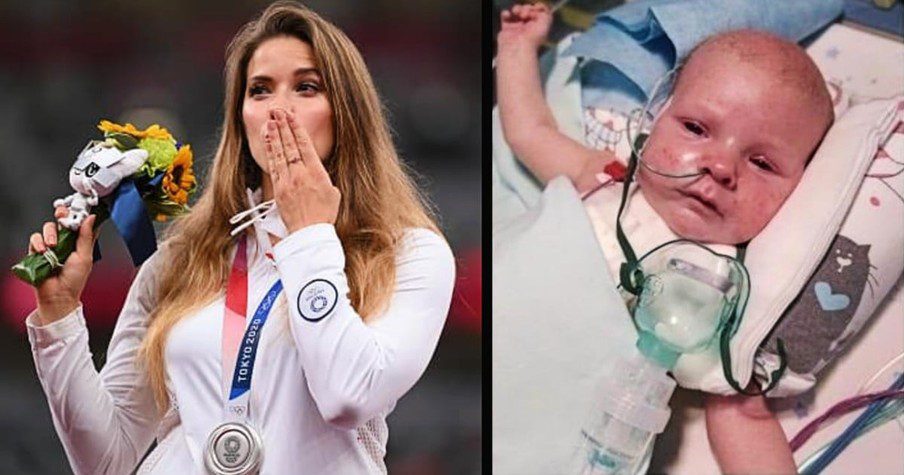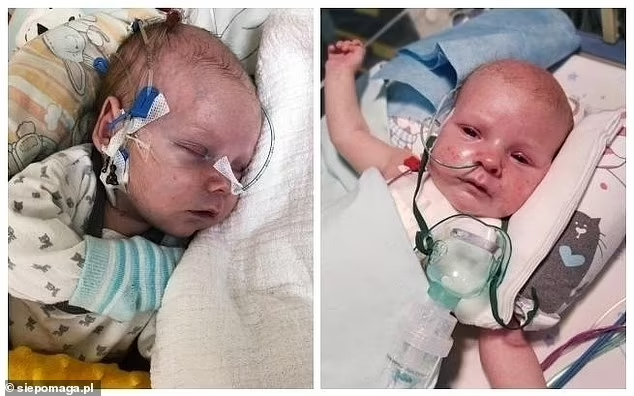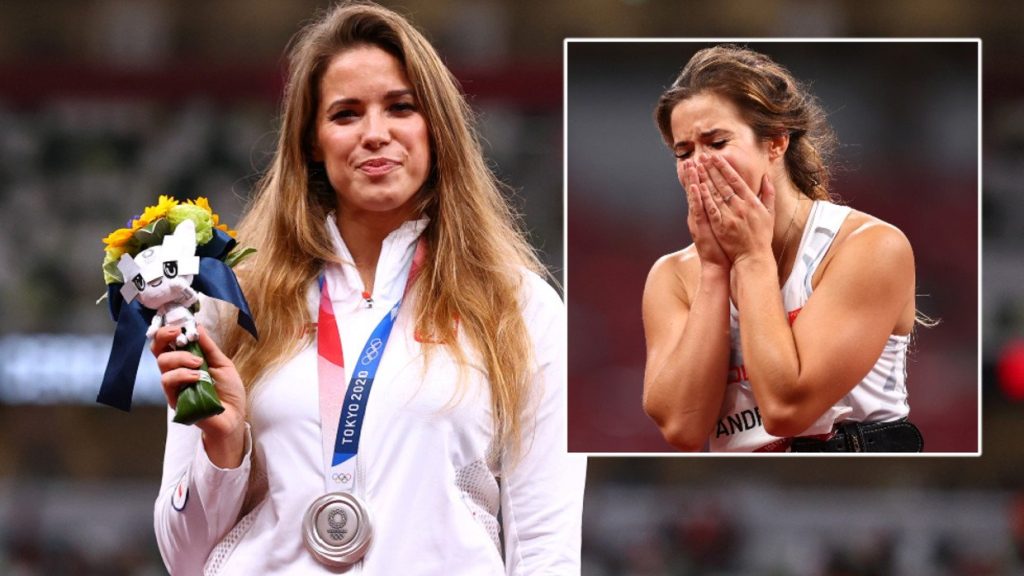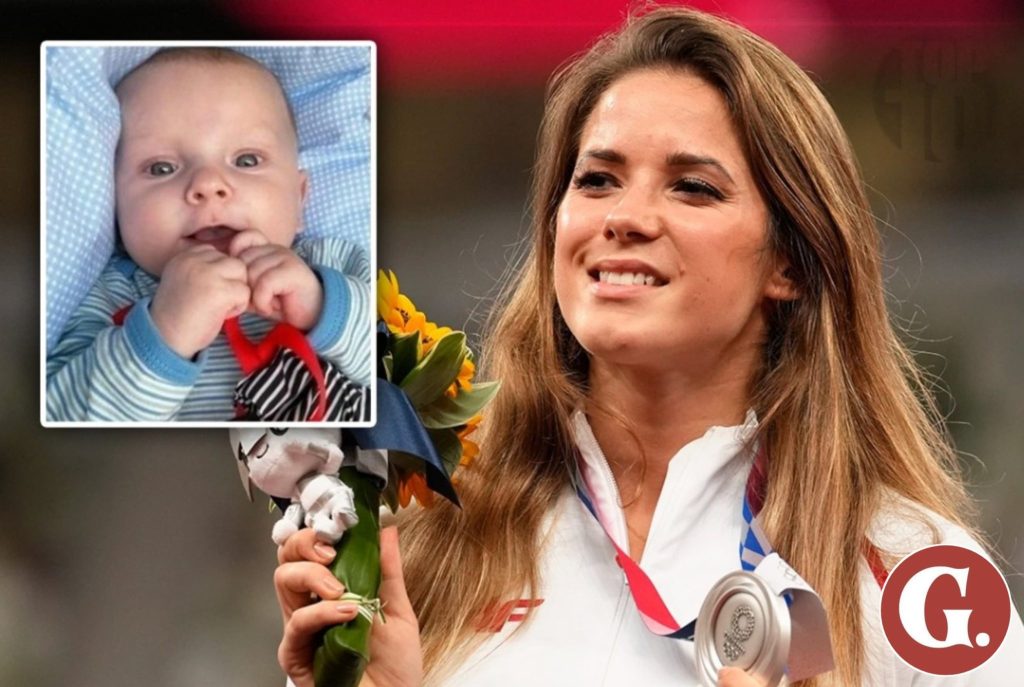This Polish Olympian Sold Her Silver Medal to Fund a Baby’s Heart Surgery — Then Something Even More Beautiful Happened
When Maria Andrejczyk stepped onto the Olympic podium at the Tokyo 2020 Games, holding a silver medal around her neck and pride in her heart, she likely didn’t know that what she’d do next would mean far more than anything measured in meters or medals. Maria had just become the pride of Poland with her second-place finish in women’s javelin, throwing 64.61 meters and marking a triumphant comeback after battling injuries that almost derailed her entire career. For most athletes, the silver medal would have been the prized symbol of dedication, sacrifice, and years of brutal training. But for Maria, that medal was destined to become something else entirely—something far more valuable than a place in the record books.

Not long after her return home from Tokyo, Maria came across a story that stopped her in her tracks. It was about a baby boy named Miłoszek Małysa, just 8 months old, who was in urgent need of life-saving heart surgery. The child had a serious congenital heart defect, and his family was scrambling to raise funds for a procedure that had to be performed in the United States. It wasn’t just a difficult situation—it was a race against time. The cost of the surgery was staggering: about $125,000. The family had already raised a portion, but they were still short by tens of thousands of dollars. In Poland, where such specialized procedures aren’t always readily available, crowdfunding campaigns have become a lifeline for families. And in this case, that lifeline came from the most unexpected and inspiring source.
Maria could have shared the post, encouraged others to donate, or contributed a modest amount. But she didn’t stop there. Instead, she made a decision so selfless that it rippled across the world. She announced that she would be auctioning off her Olympic silver medal to help cover the rest of the child’s medical costs. She explained her reasoning with the kind of grace that defines true heroes. “The true value of a medal lies in the heart, not in the metal,” she said. “A medal is only an object, but it can be of great value if it helps save someone’s life.” She emphasized that helping Miłoszek was more important than anything else and that the medal, while a symbol of achievement, could now represent something even more powerful—hope.

As news of her gesture spread, people were in awe. The auction quickly gained traction, and the bids began to pour in. Within days, a winner emerged: Żabka, one of Poland’s largest and most recognizable convenience store chains. Żabka had been following the story and decided not only to place the winning bid, but to do something that truly caught the world off guard. After transferring the money for Miłoszek’s surgery, Żabka announced that they would be returning the silver medal to Maria. In their public statement, they wrote that Maria’s actions represented “the true spirit of the Olympics and the true greatness of the human heart.” They said the medal belonged with her, as a tribute to both her athletic and moral strength.
It was a full-circle moment that felt like something out of a movie. A woman gives away her most prized possession to save a life, and the world responds by honoring that sacrifice in the most heartfelt way. The money was used to fund the child’s surgery, and Miłoszek was able to travel for treatment. Maria’s medal came back to her, not just as a symbol of second place in a competition, but as a symbol of first place in humanity. The entire chain of events restored something many of us often lose in the chaos of daily life: faith in people.

What makes this story even more remarkable is how grounded Maria has remained throughout it all. She didn’t do it for fame, or praise, or headlines. She did it because she believed it was the right thing to do. And when people across the world began calling her a hero, she humbly brushed it off. “I did what anyone with a heart would do,” she said in an interview. “I was in a position to help, so I did. That’s all.” That humility, paired with her strength and determination, made her gesture all the more powerful. It reminded people that true greatness doesn’t come from standing on a podium—it comes from lifting others up, even when the world isn’t watching.
This wasn’t the first time Maria Andrejczyk had faced adversity. A cancer survivor, she had already overcome physical pain and emotional hurdles that would break many people. In 2018, she was diagnosed with bone cancer in her shoulder, a devastating blow to any athlete. She underwent surgery, faced recovery, and fought her way back to form. Then came the pandemic, which delayed the Olympics by a year. But she never gave up. She trained, stayed focused, and made her way to Tokyo to chase her dream. That she was able to win a medal after such a journey is impressive enough—but what she did with it made it unforgettable.

In a world often saturated with negative headlines, political arguments, and division, Maria’s story offers a breath of fresh air. It reminds us of the strength of human compassion. It shows that kindness still exists—not just in grand gestures, but in the quiet conviction to do what is right, even when it comes at personal cost. Maria Andrejczyk’s silver medal was forged in steel and sweat, but it was redefined by empathy and courage.
Today, the medal sits with its rightful owner, not just because she earned it through physical strength, but because she displayed the kind of heart that no stopwatch or scoreboard can measure. Miłoszek is on his way to recovery, and the world is a little brighter because of one woman’s choice to put love above legacy. Sometimes the stories that stay with us the longest aren’t the ones written in record books, but the ones that write themselves into the soul.


